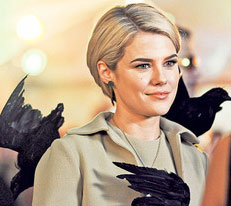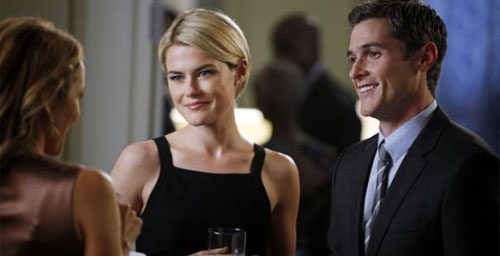Do you have a television class system? This would be a system delineating which shows you watch, and in what sequence, as well as how you categorize everything else? For some of us there are the shows we watch religiously as they air, and others we may want to “hold” for a variety of reasons. Maybe it conflicts with a more coveted show airing at the same time slot, or the show seemed a bit “iffy” to start with, or the premise was interesting, but the execution seems baffling. Those may fall into the “DVR Doldrums,” an entry on your DVR that you’ve forgotten about, that’s just sitting there, once reaching some measure of status in your viewing world, but now left to be viewed on a Sunday afternoon while you fold socks.
This is what 666 Park Avenue has become.
And, my, my. What a mess of a show this is. Seemingly, it’s like the worse combination of Rosemary’s Baby, that awful Keanu Reeves/Al Pacino movie, The Devil’s Advocate, and some other thing that wants to be horror with a bit of flashy intrigue and mystery. What it succeeds at is calling the viewer stupid and making one wonder just who television shows like this are made for. And that’s not a small claim. The show is centralized on an aging high-rise apartment building in New York City. A young couple on the rise (“yuppies” as they’re called in a bit of self-awareness), he a young City Hall staffer, and she, an out of work architect, answer an ad for an apartment managers position, which they land on the spot in this economy, naturally. The job also comes complete with a renter’s dream apartment with the kind of square footage you’d sell your soul for. HA! That’s exactly what we’re to assume is happening when they sign the contract.

Yes, truthfully. Amid all of this mind-numbingly predictability and egregious willful ignorance regarding the unemployment reality the country faces, super-secret nefarious things are happening in this building of the supernatural kind. There are ghosts traipsing the stairwells and walls that open up and absorb people. There’s an old mosaic on the floor of a creepy anteroom in the basement conjuring a notion of a secret society, and what we can only think of as “deals with the devil or a demon” are happening with the owner of the building as he smirks and nearly wiggles his eyebrows with villainy. We hear in last night’s episode the show flirted with a Tippi Hedron-esque “Birds” theme while the main character wandered the building looking for “spirits” or clogged pipes or whatever it is an apartment manager in a fancy apartment building looks for while shoeless in the middle of the night.
Really, this thing is a R.L. Stine Goosebumps tale with bad special effects and even worse acting by relative newcomers, with the exception of Terry O’Quinn and Vanessa Williams who have no business being on this show. The storyline is facile and dull, the acting is nearly non-existent, the premise is stupid, and the desire to be something edgier like American Horror Story, perhaps, is so transparent, they should just call it, “Living in the Shadow of Better Television Horror-Dramas.”
And this is the overarching problem with many dramas on network television of the last few Fall seasons. The stories are not only juvenile and too “All-American apple pie” which ask for too much suspension of belief, but worse, they rely too much on badly conceptualized ideas of what the American public actually likes and wants to see, and the ratings show it. Week two of 666 Park Avenue (5.1 million viewers, 1.7 preliminary adults 18-49 rating) was down 19 percent. So one could ask, “Who are these people that are asking for bad CGI, a rehashed former movie concept for the mid-1990’s, and such watered down horror that a twelve-year old would be bored?” We are no longer the group of television viewers who are satisfied with such namby-pamby storytelling that reaches little depth, doesn’t take risks, or lacks to give us something to firmly sink our teeth into conceptually, artistically, or even rationally. There needs to be a maturity in the dialogue, the tone, and the overall experiences of the actors in these shows. Look at the list of recent drama Emmy nominees. Boardwalk Empire, Breaking Bad, Downton Abbey, Game Of Thrones, Homeland and Mad Men. These are shows that ask the viewer to imagine a totally different world, a convincing one, whether it’s about meth dealers, pre-war butlers, the mother of dragons, terrorism, or an ad agency in the 1960’s. None of these things, people, or places are real, but we can’t see so much of the wires holding the fiction in place.
Sure, we understand that cable networks are able to get away with more. Curses! Violence! Bigger Budgets! But we’re going to go on record and say that’s all a cop out. Network television is by and large playing it too safe, and when that fails, attempts to recreate the buzz of an already existing and successful cable show by launching a bastardized cousin on their own network. Of course, too little, too late. We don’t know if the problem is pitches coming in from too small a pool, or if there is just too much fear that certain populations will in fact implode if the entire season can’t be sussed out five minutes into the pilot episode. Whatever it is, networks should stop relying on familiarity in order to goose ratings and bring in the non-cable watching demographic, and instead find, cultivate, and encourage new, fresh ideas.
ABC, CBS, NBC, and Fox: When you look at the list of dramas at the top of the heap, are any of them like anything you’ve seen before? No? Well, that’s your answer. The most successful shows right now are the ones that are able to transport viewers to an intricate place that’s believable, or can totally grab on and take you out of your comfort zone. Nowhere does that include mystical phantoms with nothing better to do than float aimlessly around an old building full of yuppies.
